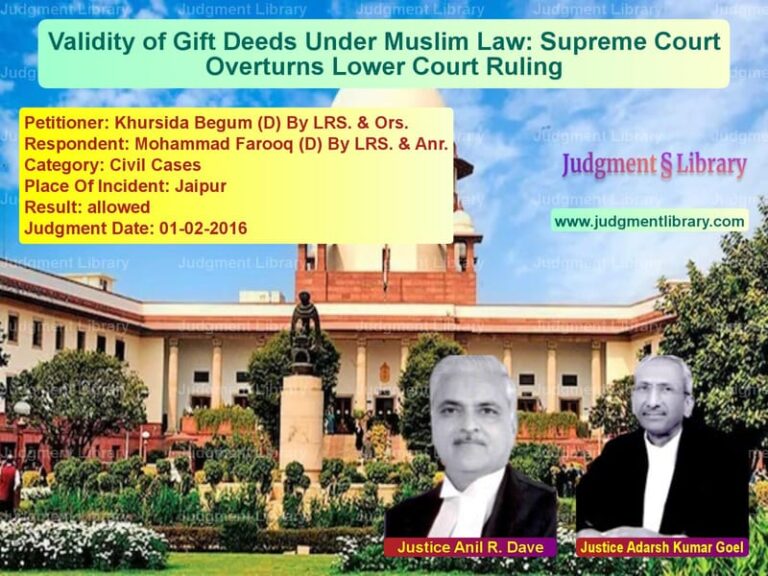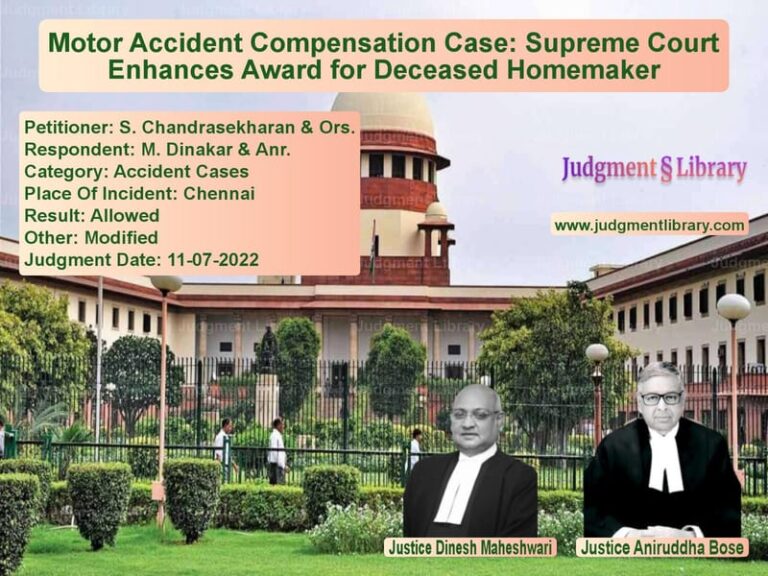Supreme Court Rules on NCLT Members’ Tenure and Selection Process
The Supreme Court of India, on August 1, 2022, delivered a crucial judgment in the case of National Company Law Tribunal Bar Association vs. Union of India. The petition was filed under Article 32 of the Constitution, challenging the Union government’s notification dated September 20, 2019, which appointed 28 Members to the National Company Law Tribunal (NCLT) for a tenure of three years. The petitioners contended that the appointment period was contrary to Section 413(1) of the Companies Act, 2013, which prescribes a tenure of five years.
The Supreme Court ruled that while the notification was inconsistent with statutory provisions, it would not interfere with the ongoing selection process. However, the Court directed the Union government to strictly adhere to Section 413 of the Companies Act in all future appointments.
Background of the Case
The dispute originated when the Union government appointed Members to the NCLT with a three-year tenure, instead of the statutory five-year term prescribed by the Companies Act. The petitioners argued that:
- The 2019 notification violated Section 413(1), which mandates a five-year tenure.
- The same government, on other occasions (July 28, 2016, September 11, 2021, and October 10, 2021), had appointed NCLT Members for a five-year tenure.
- The advertisement inviting applications for NCLT positions had also specified a five-year term.
Key Legal Issues
The Supreme Court identified the following primary issues:
- Whether the three-year tenure violated the statutory provisions of the Companies Act?
- Whether the Bar Association had the locus standi to challenge the appointments?
- Whether the Court should modify the tenure of the 2019 appointees?
- Whether granting relief would interfere with the ongoing selection process for new NCLT Members?
Union Government’s Arguments
The Union government, through Additional Solicitor General Balbir Singh, made the following arguments:
- The Appointments Committee of the Cabinet had approved the three-year tenure.
- All Members appointed under the 2019 notification had accepted the tenure without protest.
- The Selection Committee, chaired by the Chief Justice of India, had already conducted interviews for 30 new vacancies in NCLT.
- The tenure extension of certain Members had already been addressed through a new notification on June 14, 2022, which extended the term of eight Members to five years.
Petitioners’ Arguments
The petitioners, represented by Senior Advocate Arvind Datar, argued:
- The government’s 2019 notification was arbitrary and violated the Companies Act.
- NCLT appointments must be uniform, ensuring all Members serve the full five-year term.
- Retaining a three-year tenure for some Members while appointing others for five years created legal inconsistency.
Supreme Court’s Observations
1. Violation of Section 413 of the Companies Act
The Court observed:
“The appointment of persons as members of the NCLT for a period of three years is not contemplated by the provisions of Section 413(1). An administrative notification for appointment has to be consistent with the statute which governs appointments to the Tribunal.”
2. Locus Standi of the Bar Association
The government had questioned whether the Bar Association had the right to file this petition. The Court acknowledged the issue but chose to address the substantive legal question regardless of locus standi.
3. No Retrospective Tenure Modification
The Supreme Court declined to modify the tenure of the 23 Members whose three-year terms were expiring, stating:
“The issue in regard to the term of appointment being less than the term prescribed statutorily has only been raised towards the tail end of the tenure and by the Bar Association and not the Members themselves.”
4. Non-Interference in Ongoing Selection Process
The Court noted that 30 vacancies were already being processed, including those arising due to the expiration of the 2019 appointees’ terms. Given that some Members had applied afresh, interfering at this stage would create unnecessary complications.
5. Future Compliance with the Companies Act
The Court issued a clear directive to the Union government:
“We direct that in making appointments to the NCLT in the future, the Union Government shall be bound by the statutory provisions embodied in Section 413 of the Companies Act, 2013.”
Final Judgment
The Supreme Court ruled:
“While the notification dated 20 September 2019 prescribing a three-year term was not in consonance with Section 413 of the Companies Act, we note that Members appointed under the notification failed to raise a challenge, a fresh selection process has begun, and the Union Government has taken corrective action to extend the tenure of certain Members. Accordingly, the petition is dismissed.”
Impact of the Judgment
- Affirms the supremacy of statutory provisions: The Court reinforced that executive actions must align with the Companies Act.
- Preserves the integrity of the selection process: The judgment ensures that ongoing appointments remain unaffected.
- Sets a precedent for future appointments: The Union government must now strictly adhere to the five-year tenure rule.
Conclusion
The Supreme Court’s ruling in National Company Law Tribunal Bar Association vs. Union of India establishes a firm legal precedent regarding the tenure of tribunal members. While the Court acknowledged the inconsistency in the 2019 notification, it refrained from interfering with the appointments already made. However, the Union government is now bound to comply with Section 413 of the Companies Act in all future appointments, ensuring uniformity and legal clarity in NCLT tenures.
Petitioner Name: National Company Law Tribunal Bar Association.Respondent Name: Union of India.Judgment By: Justice Dhananjaya Y Chandrachud, Justice Sudhanshu Dhulia.Place Of Incident: New Delhi.Judgment Date: 31-07-2022.
Don’t miss out on the full details! Download the complete judgment in PDF format below and gain valuable insights instantly!
Download Judgment: national-company-law-vs-union-of-india-supreme-court-of-india-judgment-dated-31-07-2022.pdf
Directly Download Judgment: Directly download this Judgment
See all petitions in Corporate Governance
See all petitions in Company Law
See all petitions in unfair trade practices
See all petitions in Judgment by Dhananjaya Y Chandrachud
See all petitions in Judgment by Sudhanshu Dhulia
See all petitions in dismissed
See all petitions in supreme court of India judgments July 2022
See all petitions in 2022 judgments
See all posts in Corporate and Commercial Cases Category
See all allowed petitions in Corporate and Commercial Cases Category
See all Dismissed petitions in Corporate and Commercial Cases Category
See all partially allowed petitions in Corporate and Commercial Cases Category







